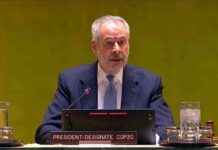Fossil Fuel Lobby Gains Unprecedented Access to Plastic Pact Talks
Representatives of ExxonMobil, Dow, BASF, and Sabic are among the oil and petrochemical firms participating in the INC-5 negotiations in South Korea. The Center for International Environmental Law (CIEL) revealed that a record number of 221 fossil fuel lobbyists are registered to take part in the last scheduled round of UN talks to agree on a new global pact to address plastic pollution in Busan, South Korea.
### A Critical Crossroads in the Fight Against Plastic Pollution
As 175 countries strive to reach a groundbreaking treaty by the end of the week to combat plastic pollution, the negotiations face significant challenges. Deep divisions persist on crucial issues, such as potentially capping plastic production, threatening the success of the talks.
### Industry Influence Undermines Environmental Progress
The majority of nations support restricting plastic manufacturing in the pact, but a powerful group of oil and gas-producing countries, including Saudi Arabia, Russia, and Iran, strongly oppose such measures. Fossil fuel firms, plastic producers, and petrochemical industry lobbyists are actively working to keep production curbs out of the UN treaty, significantly impacting the negotiations.
### Concerns Over Corporate Interference Grow
The presence of fossil fuel lobbyists at the INC-5 talks raises concerns about the undue influence of industry on crucial environmental decisions. While the number of lobbyists at the plastic talks is lower than at climate conferences, their impact is substantial. The industry’s involvement poses a challenge to creating an effective global pact on plastic pollution.
### Expert Insight: Balancing Corporate Interests and Environmental Protection
Von Hernandez, global coordinator at Break Free From Plastic (BFFP), likened the presence of fossil fuel and petrochemical companies at the negotiations to “letting foxes guard the henhouse.” This analogy highlights the potential conflict between corporate interests and environmental protection in crucial decision-making processes.
As the talks continue, the delicate balance between industry influence and environmental conservation remains a key point of contention. The need for transparency, accountability, and strong conflict of interest policies is essential to ensure a fair and effective global pact to combat plastic pollution.














